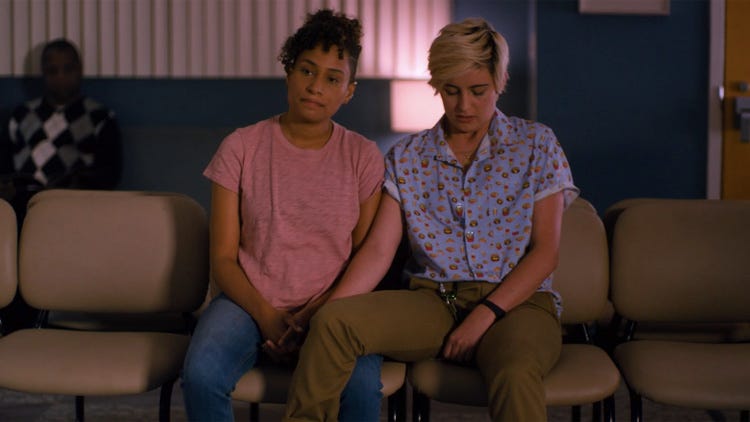[Guest Column] The L Word: Gen Q is Failing Sophie, and its Viewers Too
Jasmine James on the Perils of Poor Characterization
This is the Sunday Edition of Paging Dr. Lesbian. If you like this type of thing, subscribe, and share it with your friends!
This week I’m happy to share with you a guest column about Season 2 of The L Word: Generation Q – the much-maligned reboot of the original Showtime series – written by Jasmine James. In her own words, Jasmine is a former professional pop culture journalist and media critic from the UK who one day aims to create her own TV show. Failing that, she'd like to beat Lena Waithe in a pay-per-view arm wrestle or convince Desiree Akhavan to make another series of The Bisexual. You can follow, fight, or befriend her on Instagram @softjasmo.
I was pleased when Jasmine reached out to me about writing the piece about Gen Q because although I have watched the entire series, I’ve never been able to bring myself to write about it because there just seems to be so much to say. So I hope you enjoy this piece from Jasmine and her take on how Sophie’s character has been treated by writers and fans alike.
In a 2019 interview with The Atlantic, Jennifer Beals highlighted the way that The L Word: Generation Q explores “these characters’ lives through the deepest expression of their humanity, which is love.”
But watching Sophie Suarez in Season Two of the reboot, you wouldn’t know it.
Poor writing has been the theme of the season, with much-criticised writing decisions affecting just about every character on the show and bringing together just about everybody in our fractured little fandom. Top of the list of people done dirty by showrunner Marja Lewis-Ryan, though, is our favourite underpaid, and overworked TV producer; Sophie.
Sophie’s storyline in Season Two largely revolved around Finley and her alcoholism. The eldest Suarez sister’s role was reduced to “Finley’s babysitter” in this second season, as Sophie was almost exclusively seen reacting to or pre-empting her girlfriend’s actions. While some level of this is expected for two characters who cohabitate, are in a committed(-ish) relationship, and whose day-to-day lives are inextricable from one another’s, the way in which Sophie was portrayed in season two removed her agency, her humanity, and sidelined a so-called main character.
The problems with the writing of Sophie really come to a head in Season Two: Episode 7, “Lights,” just as Finley’s drinking problem also threatens to rush to the surface. As “Sinley” mingles at the charity poker game, we see Finley speak over Sophie, being quite affable and generating laughs, but dominating conversations with important figures in Sophie’s professional life nonetheless. If viewers are expecting Sophie to chide her girlfriend for inappropriateness, Finley is instead praised for taking the lead in these conversations. It’s an odd, out-of-character turn for someone who, just three episodes ago (more on that shortly) received a promotion after taking the initiative and making key decisions (#MoneyMoves) about the Alice Show that would fulfill a long-held career dream.
At the end of the episode, there’s a true heart-in-stomach moment as Finley, who is over the blood alcohol limit, is pulled over with Sophie in the passenger seat. This storyline continues in the next episode, “Launch Party,” as Sophie is visibly frustrated at picking up her girlfriend from the police station after Finley is arrested for driving under the influence.
What’s left unsaid bubbles just under the surface. Sophie fails to communicate why she’s upset to Finley, but so too are viewers left in the dark.
Is she outraged that Finley doesn’t understand that she’s not just concerned about the bail money? That Finley doesn’t see how she could have driven them off the road and into mortal danger? There are also the implications of Finley being pulled over by police while Sophie, who is Afro-Latina, is in the passenger seat. Since 2000, 945 people have been killed by police in Los Angeles County, according to The Los Angeles Times, and more than 80% of those victims were Black or Latino. I myself am a Black-British viewer who watches and discusses the show with another woman of colour and watching that scene, police violence seemed an inevitability. Sophie was also inebriated which could have potentially put her in further danger. In Season Two, Generation Q has done something to improve the series’ dire record with racial issues in Bette/Tina/Angie and Bette/Pippa/Dani’s storylines. Whether any of that was on the writers’ minds for the Sophie/Finley/DUI storyline though, we just don’t know.
There’s more inference required in Episode Nine, “Last Dance,” during which Finley goes missing. A distraught and dejected Sophie heads to lunch at her family home, and her mother quickly catches on, asking her daughter outright if Finley has a drinking problem. My friend and I were just as quick to jump back to early in Season One when it’s revealed that Sophie and Maribel’s father walked out on them, and we wondered if he too was an alcoholic. Again, it’s all guesswork, but filling in these gaps and explaining just why Sophie is feeling the situation with Finley so keenly (and why she feels it necessary to deny the problem) would go a long way towards explaining why the show allows her to make excuses and run around after her girlfriend.
Also in this episode, and in episode 10 “Last Dance,” we aren’t shown how Sophie feels about having had to pick Finley up from her ex’s apartment, how embarrassing this is, or how mortifying it would have been to have walked by Finley’s literal puddle of pee on the way in. It’s ironic that in a season that made digs about Gigi’s capability for emotional processing, other characters aren’t given a second to breathe before hopping from one chaotic plot to the next.
There are glimmers of what could be for this character, but it’s just not enough. In Episode Four, “Lake House,” affectionately referred to as “the Ojai episode” by the Nunrez fans among us, viewers see how Sophie plans to create documentaries. The interest in telling stories of underrepresented LGBTQ people is an important one - and one that viewers can sympathise with too - but the scene is undermined by the fact that Sophie is betraying Finley’s trust by being in Dani’s bed and having that conversation in the first place, and betraying Dani by being dishonest about her relationship with Finley.
Complicated characters are par for the course and viewers, in full cognitive dissonance mode, have given characters passes for less, e.g. Gigi leading to Dani’s arrest, nearly all of Bette’s actions in Seasons 1 and 2 and in the early seasons of the OG series, and Shane for being a former professional hairdresser but choosing to walk around with that haircut. However, this emotional whiplash and the lack of other humanising scenes means it’s no surprise why Sophie seems to get less love from viewers on the show’s social media and why her actions are criticized more often than those of other characters.
With the show not yet renewed for season three, it’s unclear whether viewers will get those missing puzzle pieces and if the writers will have time to fix up the mistakes they made with Sophie this season. A failure to improve that writing would only betray what, as Beals noted, many of the viewers came here for.






